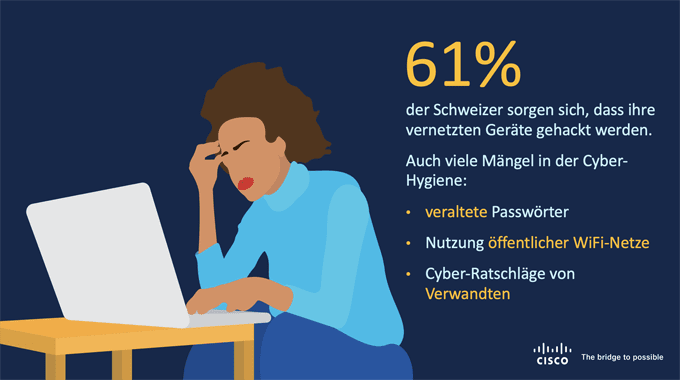IT Security in the Population: Between Carelessness and Cyber Anxiety
Many Swiss people have become much more aware of cyber dangers over the past twelve months. According to the latest "EMEA Consumer Security" study by Cisco, almost 45 percent see it that way. At the same time, nearly two-thirds (61%) of respondents worry that their networked devices could be hacked. Some security basics, such as multifactor authentication (MFA), are surprisingly well used, although 33 percent either do not use this protection method or are not even aware of it.

In companies, the topic of cyber security has now become strategically important. But what about the "normal" population? A new survey by the technology company Cisco now shows that 61 percent of the Swiss are worried about their networked devices being hacked. But they're not just worried, they're taking action: 67 percent of respondents already use multifactor authentication (MFA) to protect their devices. Of these, 33 percent use MFA for personal use, and 24 percent use it for both personal and professional use. This is an important step, because the use of private devices for professional tasks has long been the norm in Switzerland, at least since "Hybrid Work.
Boundaries between private and company devices disappear
Overall, 70 percent primarily use their own private devices for work; most (58%) use their private cell phones for company e-mails. In each case, 47 percent use it to edit documents, and 44 percent make work calls. Private devices are used somewhat less frequently for collaborative tasks, such as video conferences or virtual workspaces (36%). This already proves that securing private devices must be a priority on the part of IT or security teams. "Thanks to Hybrid Work, our daily lives - both personal and professional - are increasingly connected. This makes IT security more important than ever," says Roman Stefanov, Head of Cyber Security Sales at Cisco Switzerland. Stefanov adds that it is very gratifying that many Swiss people are aware of the issue of IT security. "However, the best knowledge is of no use if you don't consistently act on it."
Lack of cyber hygiene and lack of initiative
However, the knowledge about the critical importance of their own networked devices is offset by a certain inactivity when it comes to protecting their home WLAN, for example. Almost one-fifth of Swiss respondents (18%) have never changed their WLAN password, and another 21% have done so more than a year ago. It is striking that there are few generational differences here, with those over 45 being a bit more cautious.
The use of public WiFi networks is also critical. 40 percent log into public WiFi networks frequently or very frequently, for example, to retrieve e-mails. Even for more complex tasks, such as accessing via VPN or using confidential documents, 32 percent use public WiFi frequently or very frequently. This can be problematic because little is known about the level of security of these networks, and even unauthorized intrusion by hackers becomes possible. "With a public Wi-Fi network, no one knows who is listening and for what reasons, or how well the operator has secured it," says Martin Lee, EMEA lead at Talos, Cisco's threat intelligence and research organization. "Using your own phone's hotspot feature with a strong password is safer than using a public network. And using a VPN is always more secure than not using a VPN."
Majority of population follows cybersecurity advice from personal environment
When it comes to advice on securing devices and safe surfing, the majority of Swiss respondents rely on their personal environment. 37 percent follow the advice of friends and relatives. 32 percent rely on "common sense" and almost one in four tries to find IT security tips in traditional or social media. Advice from device manufacturers is taken up by around one-fifth of respondents (21%), and tips from government agencies by only around 16 percent.
The "EMEA Consumer Security" study was conducted in August 2022 by Censuswide on behalf of Cisco in Switzerland and other countries, including the United Kingdom, Germany, France and Italy. The survey involved 1,000 respondents in Switzerland, 47 percent of whom were full-time employees.
Source: Cisco









